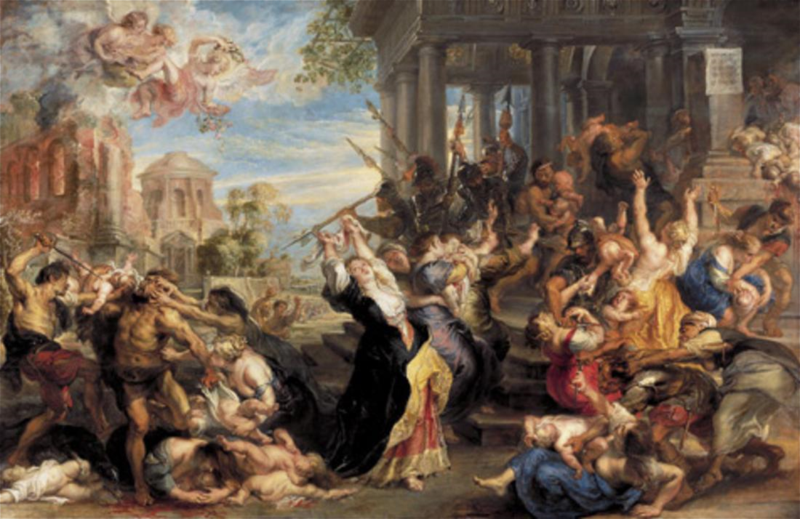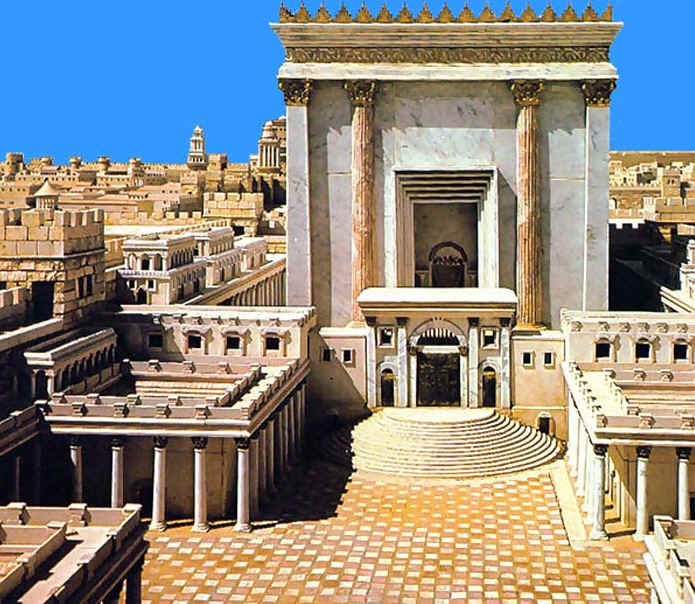This is a cross-post from Joseph W
In the advent season, Christians traditionally remember the lead-up to Jesus’ birth. The gospel accounts set the context of the nativity, noting that Jesus was born in Bethlehem in Judea “during the time of King Herod”.
Some people who hear that Herod was the “king of the Jews” at the time may (without realising) assume that Herod was a popular king amongst the Judaeans, a religiously-committed Jew, or a king who sought to please his Jewish subjects. Quite unconsciously, they may make a causal link between the political Jewish state and the actions of King Herod.
Given the (quite correct) Christian identification of Herod as an evil ruler, it is vital that Christians should also understand how and why Herod came to be known as the king of the Jews.
The title “king of the Jews” was a title bestowed upon Herod by Rome, and not a title that reflects Herod’s popularity at the time. The legacy of Herod has endured mainly for two reasons, namely his brutal policies and his wonderful architecture.
Christians remember the Massacre of the Innocents, in which Herod commits to slaying the babies of Bethlehem, thus hoping to eliminate his potential rival as ‘king of the Jews’, Jesus ben Joseph.
Rubens: Massacre of the Innocents (1611-12)
Geza Vermes – who highly rates Josephus as an authority on Jesus – argues that the event was made-up, as does E.P. Sanders – one of the key thinkers on the New Perspective on Paul.
Biblicist Robert Eisenman (1998) argues that the massacre may have occured and would have been consistent with Herodian policy. Anglican scholar R.T. France (2007) argues that the massacre probably did occur, but it was on too small a scale to be noted by Josephus, thus explaining why Josephus does not record the event.
As we shall see, mass-infanticide is consistent with Herod’s approach to ruling a nation.
But what of Herod, king of the Jews?
How did he earn his title?
Was Herod even Jewish?
A century earlier, the Hasmonean priest-king John Hyrcanus had launced various military campaigns as he tried to expand the borders of Judaea. Hyrcanus was the nephew of Judah Maccabee, the hero of Hannukah. Judah Maccabee had achieved Jewish independence and had defeated the Hellenisers.
John Hyrcanus led a conquest of Idumaea, the Biblical land of Edom. Upon victory, Hyrcanus forced the Idumaeans to choose between slavery, and submitting to the laws and customs of the Jews. The Idumaeans chose to convert.
Herod was the second son of a high-ranking Idumaean official, Antipater, who rose to prominence in the Hasmonean court. Antipater supported Julius Caesar in his battles with Pompey. Caesaer rewarded Antipater by making him the prime minister of Judaea.
Antipater appointed his son Phaseal as governor of Jerusalem and his son Herod as governor of Galilee.
Herod’s policies were brutal, and he quickly drew condemnation from religious Jews. The Supreme Court of Jewish Law (overseen by priest-king Hyrcanus II, the grandson of Hyrcanus I) summoned him to trial in Jerusalem. Herod arrived in court with a royal guard and in full regal attire.
Quite surprisingly, the Jewish rebukes against Herod were so strong that the priest-king had to abandon court proceedings, and Herod quickly fled Jerusalem. Herod would never again pay attention to the Sanhedrin, and would circumvent and undermine it where possible.
Kasher and Witzum note:
Herod’s trial before the Sanhedrin was apparently a significant and highly traumatic event for him, largely because the experience was so threatening and emotionally charged. […] For the first time in his life, he experienced the feeling that he was a mere mortal in the eyes of the Jewish law and the supreme Jewish establishment. He became preoccupied by an obsessive fear of the Jewish people and its institutions, nursing a hatred and aversion to the spiritual leadership of the rabbinic Sages. […] As time progressed, his sense of antagonism intensified, not only towards the Sanhedrin and its leaders but also towards their supporters in the Jewish public, whom he saw as representing “the people”.
Incensed, Herod resorted to marching on Jerusalem and ousting Hyrcanus II, but was discouraged by his father and brother.
When Hyrcanus II eventually was challenged and defeated by his own nephew Antigonus, Herod judiciously chose to go to Rome and inform the Senate of the events.
Herod was sure he would be a far better ruler. Herod skilfully convinced the Senate to vote for him as ‘king of the Jews’, with some help from Marc Anthony and friends. The vote passed.
This is how Josephus reports events:
[When] Antony came in, and told [the Senate] that it was for their advantage in the Parthian war that Herod should be king; so they all gave their votes for it. And when the senate was separated, Antony and Caesar went out, with Herod between them; while the consul and the rest of the magistrates went before them, in order to offer sacrifices, and to lay the decree in the Capitol. Antony also made a feast for Herod on the first day of his reign.
Josephus shows that Herod offers Roman sacrifices here to celebrate the decision. Religiously-committed Jews would simply not have imagined offering sacrifices to Roman gods.
So Herod returned to Jerusalem to defeat Antigonus. Intriguingly, Antigonus became the first Jewish king to die whilst bound to a cross.
Before his death, Antigonus claimed that the Romans should not make Herod the king of Judaea, seeing as he was:
“a private man, and an Idumean…half Jew.”
Note Antigonus’ disparaging reference to the Idumeans, whom (as we saw earlier) had been forcibly converted to the Jewish religion by the Hasmoneans.
However, Herod did become the king of the Jews – through the Roman Senate and not through the will of the Jewish people. “King of the Jews” was thus a title that Herod obtained directly from Rome in a spiritually and politically Roman way.
Herod was not a believer in either Roman gods or the Jewish god. Rather, he realised how he could use religion for political expediency.
- Herod’s Temple as it would have appeared
Herod would eventually reconstruct Solomon’s Temple to make it even more glorious. Herod also built the seaside city of Caesarea Maritimia as a tribute to Caesar, complete with temples dedicated to the Caesar cult.

Remains of the temple in Caesarea Maritima
Herod’s attitude towards Roman religion also explains why, years later, Herod would sentence young Pharisees to death for smashing the Roman golden eagle that overlooked the entrance to the Temple. (The Pharisees had taught that the eagle was a symbol of Roman idolatry.)
It is worth bearing in mind that Temple sacrifices were of huge importance to both Rome and Jerusalem, and Rome expected her subjects to offer sacrifices on Rome’s behalf in their own temples.
To further understand Herod’s attitude towards Jewish religious life, we turn towards the episode of Mariamne and Aristobulus.
- Herod’s palace at Herodium
Mariamne was the second wife of King Herod, born from a privileged Hasmonean family. Aristobulus was Mariamne’s brother. Herod was enraptured by Mariamne’s charms. Mariamne begged Herod to make her teenage brother Aristobulus the high priest. Herod did so.
Herod went to Jerusalem to see Aristobulus officiate in the Temple for the first time. Aristobulus proved hugely popular with the crowds. Herod feared Aristobulus might win the hearts of the people. They might follow him as king instead. So Herod arranged for the young lad Aristobulus to be drowned.
In the years that followed, Herod also allowed Mariamne to be put to death for allegedly conspiring against him. Herod had Mariamne’s mother Alexandra killed too. Herod also feared the popularity of his two sons by Mariamne, Alexandros and Aristobulus, when they were well-received by the Jerusalemite populace. He had them murdered in 7BC.
Herod had murdered an entirely innocent Hasmonean family. The Hasmoneans had been the traditional enemies of the Hellenisers, yet the Rome-associated Herod had killed off the last powerful Hasmonean family, effectively ending any hopes for Hasmonean rule in Judaea.
- Waterhouse: Mariamne Leaving the Judgement Seat of Herod (1887)
Herod, then, was a terrified megalomaniac convinced that his position as king of the Jews will be challenged by a young upstart – from teenagers to young children to his own sons. He was also an extremely intelligent man and a wonderful builder, able to construct magnificent fortresses, cities and temples.
Maybe Herod’s father should have just encouraged him to be an architect. That way he would never have become ‘king of the Jews.’
Bibliography:
Cassius Dio, Roman History 49.2
Josephus, Antiquities
Eisenbaum, R., James The Brother of Jesus, Penguin, 1998
France, R. T., The Gospel of Matthew, Wm. B. Eerdmans Publishing Company, 2007
Kasher, A., Jews, Idumaeans, and ancient Arabs: relations of the Jews in Eretz-Israel, Mohr Siebeck, 1998
Kasher, A., Witzum, E., King Herod: a persecuted persecutor : a case study in psychohistory and psychobiography, Walter de Gruyeter, 2007
Richardson, P., Herod: King of the Jews and friend of the Romans, Continuum International Publishing Group, 1999






